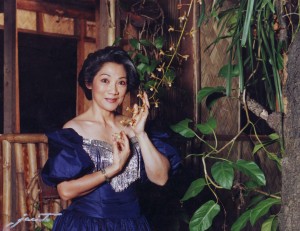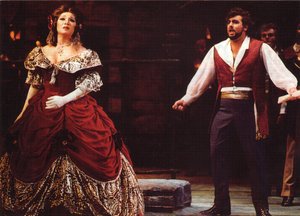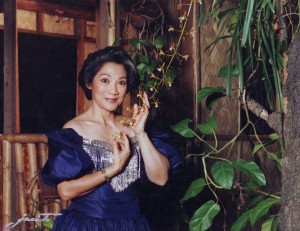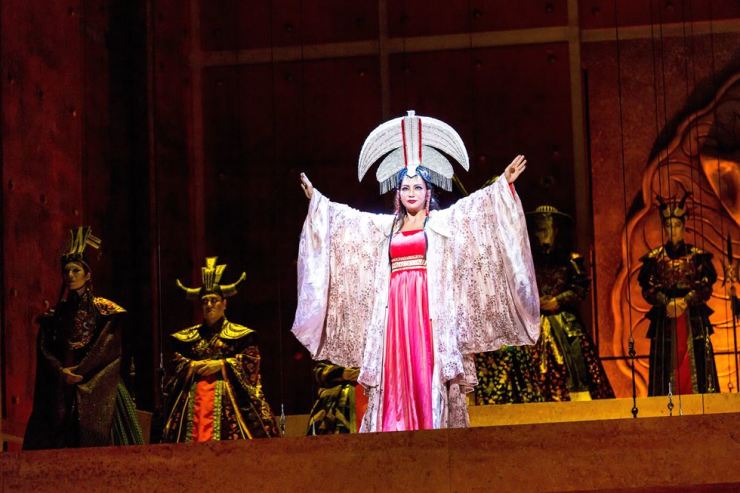By PABLO A. TARIMAN
 THERE’S a lot that renowned Filipina soprano Evelyn Mandac can share with aspiring local singers.
THERE’S a lot that renowned Filipina soprano Evelyn Mandac can share with aspiring local singers.
La Mandac is in town and she will be conducting master classes for singers in a private home on March 18 and in San Lorenzo Village arranged by the Philippine Opera Company from March 27 to May 5. (Interested parties may call tel.no. 892-87-86.)
During her time, La Mandac represented class and distinction in the opera world. In the late 1960s to the 1970s, she was The Diva in every sense of the word; she sang like one and never acted like one.
Married to an investment banker and now based in New York where she continues to teach the fine art of singing, La Mandac has shared the stage with the likes of Placido Domingo and Shirley Verrett in the San Francisco Opera production of “L’Africaine,” Brigitt Nillson in “Turandot” and Dame Kiri Te Kanawa in “Nozze di Figaro.”
For the record, she is still the first and the last Filipino singer to invade the well-guarded Metropolitan Opera of New York in its 1975-76 season through the role of Laureta in Puccini’s “Gianni Schicchi.”
She has been heard with the Washington Opera in the title role “Manon,” as Mimi in “La Boheme”, Sicle in “L’Ormindo,” and Anne Truelove in “The Rake’s Progress.” Performances with the San Francisco Opera included the roles of Despina in “Cosi fan tute,” Susanna in “Le Nozze di Figaro,” and Inez in Mayerbeer’s “L’Africaine.”
What’s the big deal about singing at the New York Met?
Singing at the Met (or for that matter, the La Scala di Milan in Italy) is like breaking through a Mafia of established musicians.
In the past, the Met was also the territory of the likes of Maria Callas and Renata Tebaldi. Even an American singer like Beverly Sills had to wait in the latter part of her career before her voice was heard at the Met.
Are the corridors of opera power of the Met as loathsome as the intrigue-laden corridors of a presidential palace?
Answering this query, Mandac said: “I have heard of that but when I made my debut there, I was extremely lucky. They were very kind to me and very helpful. The chorus members were very kind and from what I heard, they are the opposite of kindness when they don’t like the singer.” She recalled that when she returned at the Met for Hansel and Gretel, the rehearsal conditions were not ideal. They rehearsed in small rooms, everything was new to her and it was already opening night.
“The chorus advised me what to do and it was a big help for me,” she recounted. “The sets of Hansel were protruding over the orchestra and if you were not careful, you would end up singing your way to the orchestra pit.”
She added: “But on the whole, it was a dream come true. I never really thought I’d make it at the Met.”
Singing at the Met doesn’t always guarantee success. New York audiences represent the elite of the opera world and they can be as picky and scary as the opera audience of La Scala di Milan, who are armed with tomatoes on opening night and are ready to hurl them onstage if the singers didn’t live up to expectations.
In her case, it was a lovely debut as confirmed by the long lines of well-wishers after the last curtain call.
 The first Filipino soprano to have sung with Domingo, La Mandac has insights of the famous tenor not known to the public. She said Domingo is not just a singer but a good pianist as well.
The first Filipino soprano to have sung with Domingo, La Mandac has insights of the famous tenor not known to the public. She said Domingo is not just a singer but a good pianist as well.
The soprano also found out that Domingo has no superstar complex even if at that time, he was already the toast of the opera world.
The Meyerbeer opera “L’Africaine” was deemed too long and the director decided he had to cut some arias. When Mandac heard of the plan, she had reason to be alarmed. Her part was not that big and if her aria in the last part was cut, she would be left with just a few arias to sing.
Then Domingo said during the production meeting, “Hey, listen. I already have a lot to sing. Take some of my scenes out.”
“That was really generous of Domingo,” the soprano said. “Some people — especially big stars — would never do that.”
After the fame, the glory and excitement of opening nights, La Mandac is just content with her new-found spiritual fulfillment and teaching in between.
“Music and the spiritual life actually go hand in hand,” she said. “They are actually related. When I work with my students, you discover your own voice as well as that of the student. When you are able to confront your emotional crisis, sometimes a healing happens.”

